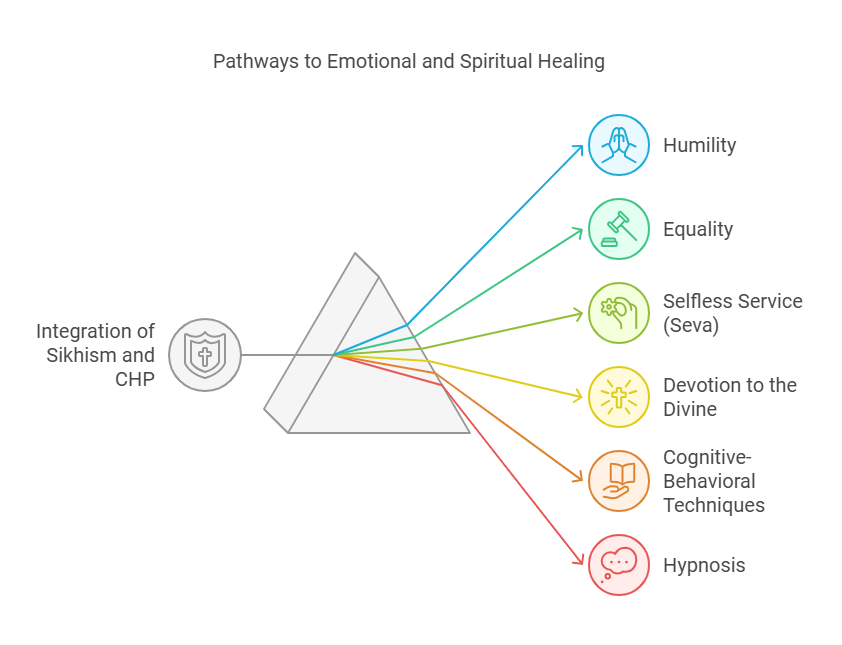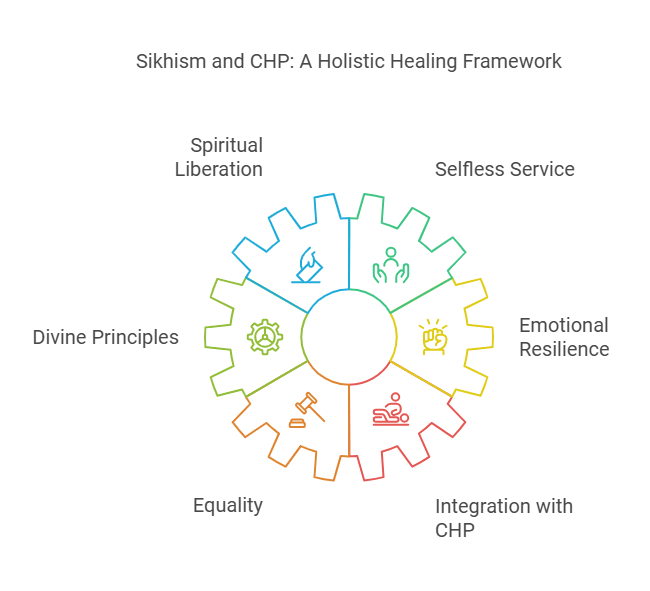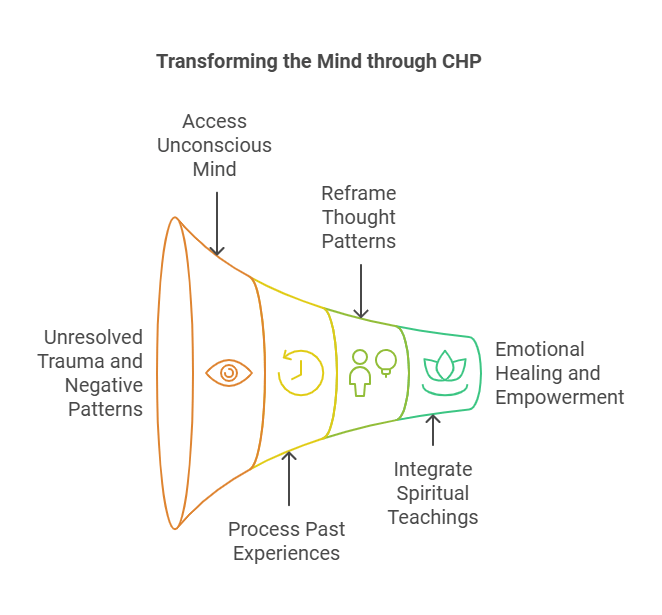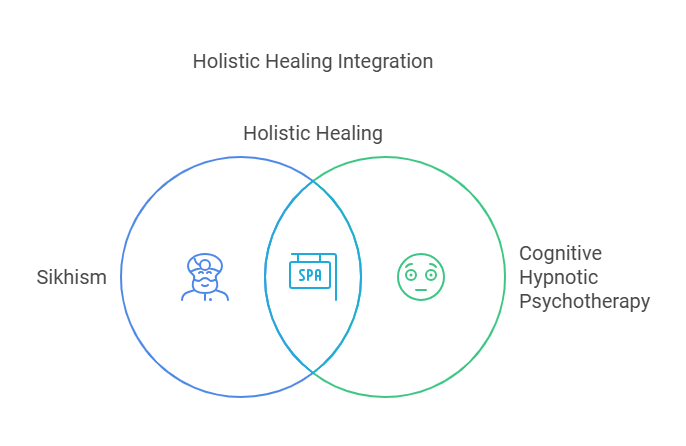Introduction: Beyond Therapy—The Intersection of Psychology and Spirituality
Emotional wellbeing is the foundation of a fulfilling life, and yet many individuals continue to grapple with inner turmoil, unresolved traumas, and the dissonance between their mental health and spiritual lives.
Traditional psychotherapy has long been a cornerstone in helping individuals navigate mental and emotional challenges, yet the integration of spiritual principles offers a profound opportunity for holistic healing.
Among the many spiritual traditions that emphasize the importance of inner peace, selfless service, and divine connection, Sikhism stands out for its timeless teachings that deeply align with the therapeutic goals of Cognitive Hypnotic Psychotherapy (CHP).
Sikhism’s core values of humility, equality, selfless service (Seva), and devotion to the Divine offer pathways to overcome emotional suffering, self-doubt, and disconnection.
Similarly, Cognitive Hypnotic Psychotherapy (CHP), which blends cognitive-behavioral techniques, hypnosis, mindfulness, and other transformative modalities, provides tools for accessing the subconscious mind, altering negative patterns, and achieving sustainable emotional healing.
This article explores the profound integration of Sikhism with CHP, highlighting how these two powerful systems of thought and practice can work in unison to promote emotional liberation, spiritual resilience, and deep personal transformation.
By blending Sikh teachings with the therapeutic techniques of CHP, individuals can embark on a healing journey that is not only psychological but also profoundly spiritual—leading to lasting change, peace, and connection to their higher selves.

Sikhism: A Holistic Philosophy for Emotional and Spiritual Healing
At the heart of Sikhism is the pursuit of spiritual liberation (Mukti), which is achieved through a deep connection with God (Waheguru), selfless service (Seva), and living in alignment with divine principles.
Sikhism emphasizes inner peace, self-discipline, humility, and compassion as essential virtues for overcoming suffering and emotional distress. Central to Sikhism is the understanding that emotional and psychological challenges stem from separation from the Divine and ignorance of one’s true, infinite nature.
Sikhism encourages followers to transcend the ego, break free from attachments, and align their actions with the will of the Divine. It teaches that by surrendering to the Divine order, individuals can transcend their emotional pain, experience profound peace, and cultivate resilience, even in the face of adversity.

Importantly, Sikhism stresses that equality—the understanding that all people are equal in the eyes of God—empowers individuals to overcome feelings of inadequacy, shame, or unworthiness, which are often at the root of emotional distress.
For individuals struggling with mental health challenges, Sikhism offers a spiritual framework for healing that nurtures the mind, body, and soul.
When integrated with Cognitive Hypnotic Psychotherapy (CHP), the principles of Sikhism not only help clients heal from psychological trauma but also foster spiritual growth, enabling them to cultivate a sense of peace, purpose, and interconnectedness with the world around them.
Cognitive Hypnotic Psychotherapy (CHP): The Science of Mind and Spirit

Cognitive Hypnotic Psychotherapy (CHP) is a sophisticated integrative approach that combines elements of cognitive-behavioral therapy (CBT), hypnosis, mindfulness, NLP (Neuro-Linguistic Programming), and other therapeutic techniques.
The goal of CHP is to help individuals access and transform the unconscious mind, reprogramming deep-seated negative patterns and fostering emotional healing.
CHP works on the premise that unresolved trauma, limiting beliefs, and negative thought patterns often reside in the subconscious mind, shaping behaviors, emotions, and perceptions.
By utilizing hypnosis, therapists can guide clients into deep states of relaxation where they can uncover and process past experiences, release emotional blockages, and adopt new, empowering beliefs.
Combined with cognitive reframing techniques, CHP helps clients gain awareness of the mental habits that perpetuate their distress and replace them with healthier, more adaptive thought patterns.
What sets CHP apart is its holistic nature—it doesn’t just treat the symptoms but addresses the root causes of emotional challenges by blending cognitive, behavioral, emotional, and spiritual elements.
This makes CHP an ideal framework for integrating Sikh teachings, which emphasize the cultivation of virtues such as humility, service, compassion, and acceptance.
Through CHP, clients can access a deeper state of mindfulness and self-awareness, which are key to managing stress, anxiety, depression, and emotional pain.
As individuals cultivate a more empowered mindset and positive emotional regulation, they are also able to integrate the spiritual teachings of Sikhism, leading to an enriched healing experience.
Core Sikh Principles that Align with CHP: A Path to Healing and Transformation
The integration of Sikhism with CHP goes beyond the surface-level application of therapeutic techniques. At its core, this integration encourages a holistic transformation—a spiritual, emotional, and psychological renewal.
By incorporating the following Sikh principles into therapy, individuals can achieve not only emotional healing but also profound spiritual growth.
Seva (Selfless Service): Shifting Focus from Self to Others
Seva is the practice of selfless service to others without expectation of reward. It is a cornerstone of Sikh practice, reinforcing the values of humility, compassion, and interconnectedness.
In the context of CHP, Seva offers an antidote to self-centeredness and emotional stagnation, both of which can be significant sources of distress.
Therapists trained in CHP can incorporate Seva into therapeutic practices by encouraging clients to engage in community service or perform small acts of kindness.
By focusing on the welfare of others, clients experience a shift in focus from their own emotional struggles to a greater sense of purpose and meaning. This fosters empathy, reduces emotional isolation, and cultivates a deep sense of connection with the world.
Research in psychology has shown that acts of kindness and service boost oxytocin levels, promote wellbeing, and enhance emotional resilience.
For clients struggling with depression, anxiety, or grief, Seva offers a powerful method of self-transcendence, helping them move beyond their pain and find peace in service to others.
Simran (Remembrance of God): Cultivating Presence and Mindfulness
Simran is the practice of repeating the name of God (Waheguru) as a form of meditation, which is central to Sikh spiritual practice. Simran has been shown to enhance mindfulness, focus, and inner peace, and it serves as a powerful tool for managing emotional distress.
In CHP, Simran can be used to help clients enter a deeply meditative state, reduce anxiety, and increase emotional regulation.
The integration of Simran into CHP helps clients reconnect with their spiritual essence, providing a sense of divine presence that can comfort and heal. In moments of emotional turbulence, Simran becomes an anchor, helping clients stay grounded and centered.
It is a practice that encourages awareness in the present moment and enables individuals to view their emotional struggles from a higher, spiritual perspective.
Chardi Kala (Eternal Optimism): Building Resilience and Hope
Chardi Kala, or eternal optimism, refers to maintaining a positive, hopeful outlook, regardless of life’s challenges. This principle is especially valuable in therapy, as it helps clients reframe adversity and view difficulties as opportunities for growth and learning.
By adopting the mindset of Chardi Kala, individuals can face life’s challenges with strength and resilience.
Through CHP, therapists can help clients cultivate this principle by teaching cognitive reframing and encouraging positive affirmations rooted in Sikh teachings. The practice of Chardi Kala empowers clients to build a resilient mindset, enabling them to cope with life’s uncertainties with grace and optimism.
The Synergy of Sikhism and CHP: A Holistic, Transformational Healing Process
The integration of Sikhism with CHP creates a truly holistic approach to healing—one that addresses the mental, emotional, spiritual, and behavioral dimensions of the individual. By incorporating Sikh principles into therapeutic techniques, clients can experience:

- Spiritual and Emotional Healing: The integration of Sikh values such as Seva, Simran, and Chardi Kala promotes both emotional freedom and spiritual growth, enabling clients to heal at a profound level.
- Resilience and Empowerment: Through practices such as cognitive reframing, hypnotic regression, and the cultivation of spiritual virtues, individuals develop the emotional resilience necessary to thrive amidst life’s challenges.
- Meaningful Connection to the Divine: The practice of Simran, mindfulness, and service helps individuals re-establish a deeper connection to their spiritual selves, providing a source of strength, peace, and guidance.
- A Positive Mindset and Inner Peace: By focusing on eternal optimism and spiritual surrender, clients can overcome negative thought patterns and embrace life’s impermanence with acceptance and grace.
Case Study: A Journey of Deep Healing
Client Profile: Amrit, a 45-year-old Sikh woman, came to therapy seeking help for chronic grief after the loss of her mother. Despite outward success, she struggled with deep emotional pain and a sense of spiritual disconnection. Her anxiety, anger, and guilt created barriers to healing.
Therapeutic Process: Amrit was introduced to the principles of Simran and Seva. She began practicing Simran daily, which helped her develop a calming presence amidst her grief.
Engaging in Seva in her local community allowed her to shift focus from her pain to acts of kindness, which brought her a sense of purpose. Through CHP, Amrit also explored the root causes of her grief and processed buried emotions from her childhood.
Results: After several months, Amrit reported significant emotional relief. Her anxiety and anger decreased, and she experienced a renewed sense of spiritual connection.
The integration of Sikh teachings helped her heal not only emotionally but spiritually, as she found peace in her mother’s passing and began to embrace her role in the world with renewed purpose.
Conclusion: A New Paradigm for Emotional Wellbeing
The integration of Sikhism and Cognitive Hypnotic Psychotherapy offers a groundbreaking approach to healing that combines the best of both spiritual wisdom and modern therapeutic techniques.
By weaving together Sikh principles with the science of mind, body, and spirit, individuals can embark on a journey of true transformation—one that leads to emotional freedom, spiritual awakening, and an empowered, resilient life.
This integrated model opens a new paradigm in emotional wellbeing, where therapy is not just about alleviating symptoms but about nurturing the soul, connecting with the Divine, and embracing life’s journey with grace and peace.
Through the profound synergy of Sikhism and CHP, individuals can heal at the deepest level, achieving holistic wellness and discovering their true, divine nature.

